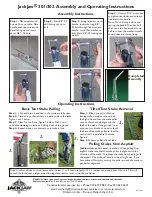
Instructions
for Use,
Cleaning,
and Care
Carex Health Brands
921 E. Amidon
Sioux Falls, SD 57104
800.526.8051
www.carex.com
These instructions
are guidelines only.
Use only as instructed
by your healthcare
provider.
Crutches
(continued on next page)
What are Crutches Used For?
Crutches are used for support while walking.
How Do I Adjust The Crutches?
• Wearing shoes, stand straight with shoulders relaxed and arms hanging loosely.
• Adjust the length of the crutches so that the crutch top is approximately
2” below the underarm.
• Next, adjust the handles:
1. Stand with crutches placed 6” in front of and 6” to the side of your feet.
2. Adjust handle until your elbow is bent approximately 20° to 30º. After
adjusting, ensure that the spring buttons are fully engaged and screws
are tightened.
WARNING
Make sure that you are correctly fitted, all spring buttons are fully
engaged, all screws are tightened, and hand grips are attached securely.
WARNING
Keep your wrists straight when using crutches.
Walking
• Bring the crutches forward at the same time, 6 inches to 12 inches, keeping your
injured leg off of the ground.
• Supporting your weight with your hands (not your underarm), carefully swing
your good leg forward, placing this foot just in front of the crutches.
• Keep your head and posture upright to maintain balance.
WARNING
When using crutches, watch for possible safety hazards such as cords,
water or oil on floor, floor rugs and other obstacles.
Walking Up Stairs
• Use a handrail if available. Carry the crutch closest to the handrail in the other
hand. Hold the handrail with the free hand.
• Step up with the stronger leg first, followed by crutches and the injured leg.
Walking Down Stairs
• Place crutches down on stair first, followed by injured leg, then the stronger leg.
Sitting Down
• Back up to the chair (or whatever you are sitting on) until you feel the back of
your legs touch the chair.
• Hold both crutches by the hand grips in the hand on the injured side.
• Hold onto the chair with the other hand and lower yourself slowly, bending at
the hips.
• Unless authorized by your health professional, keep your injured leg off the
ground, and your weight on the good leg.




















